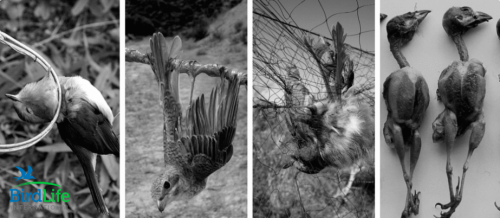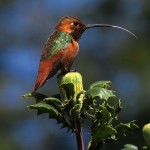Courtesy of BirdLife International

Today is World Migratory Bird Day, and this year is focused on the illegal killing, taking and trade of migratory birds. All science indicates that migratory birds are declining in large numbers.
On the African-Eurasian migratory flyway, one in ten migratory bird species are threatened with global extinction. With an estimated 6 million birds killed and trapped illegally every year, Egypt is one of the most dangerous places for migratory birds in the Mediterranean, followed by Italy and Lebanon.
Watch the extremely graphic video of birds dying agonizing deaths at the hands of hunters:
A new study released today by Nature Conservation Egypt (BirdLife in Egypt) and the BirdLife International Secretariat revealed over 75 percent of bird killing and trapping in Egypt is illegal. Download the study (PDF).
“Egypt is situated on important migration routes for birds travelling between their breeding grounds in Eurasia and their wintering sites in Africa,” said Claire Thompson, Conservation expert at BirdLife International.
“Studies such as these enable BirdLife Partners to push for a more strategic and holistic approach to eliminating illegal killing of birds in the Mediterranean region.”
The Egypt study was undertaken to understand the socio-economic dimensions of bird hunting, and assess the resource dependency and social resilience and communities’ ability to cope with any future changes in regulations and conservation strategies.
Dr. Salwa Elhalawani, author of the study for Nature Conservation Egypt stated,”The study sheds light on the magnitude of the illegality of hunting along the Mediterranean cost of Egypt.But, most importantly, we have profiled hunters and mapped their socio-economic background, so we can recommend mechanisms to help them, as well as the birds, in the future.”
Here are some of the findings:
- Three hunter “profiles”:Commercial hunters motivated by the economic value of bird selling; subsistence hunters who hunt for securing source of protein; and recreational hunters;
- Almost 50% are fishermen and live in families with more than four members. But almost 20% are public-sector employees;
- At least 75% of hunting observed is illegal and bird hunting has significant socioeconomic importance to the local communities along the coast;
- Almost all hunters use illegal fine ‘trammel’ nets (100%) and call devices (85%) knowing these are illegal;
- Only 7% keep the birds for personal consumption. Most of the birds are sold to the market;
Almost all hunters target quails and doves. Nearly 80% target also songbirds; - Education: nearly two-thirds of hunters interviewed had either primary or no education;
- Over 50% of the hunters derive 50% or more of their income from the activity, with 21% earning more than 75%.
“The socioeconomic study provides much needed context for all scientific research taking place by the Responsible Hunting Programme,” noted Noor A.Noor, Executive Coordinator at Nature Conservation Egypt. “By deepening our understanding of the human factors behind illegal killing and trapping, we increase our chances of taking suitable measures, in coordination with local communities, to promote sustainable practices.”
The researchers made seven key recommendations for action:
- Securing high-level political support to ensure that measures to address the dilemma of bird hunting is given a high priority in conservation sectors.
- Enforcement of hunting regulations to bring the hunting of birds under more effective control.
- Increase awareness of bird conservation through local mosques’ Imams and Islamic public figures in media, to convey the conservation message to local people, trying to shift their behaviour away from illegal and/or unsustainable activities, and developing an awareness of bird conservation focused on school age children.
- Mainstreaming the socioeconomic issues of bird hunting including through establishment of fish farms to be run by community member and small loans at low interest rate for starting small businesses, and development of governmental incentive plan to cover part of the loss that might occur from new conservation strategies and hunting regulations.
- Development of a mechanism to control, track and follow up on bird hunting permits.
- Improving the knowledge base of official stakeholders towards the hunting and trading of birds. Particularly attention should be given to those species in trade of high conservation concern such as birds of prey.
- Controlling the export of wild birds.
Learn more about what Bird Life International is doing to stop the illegal killing of birds.




